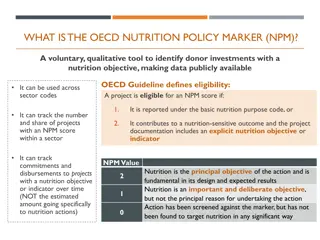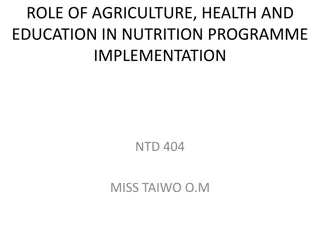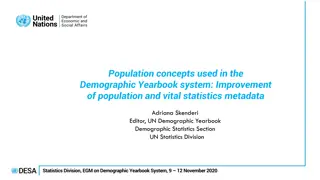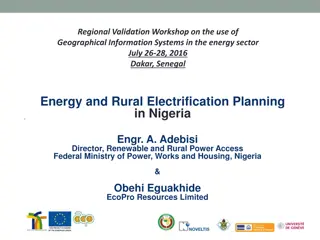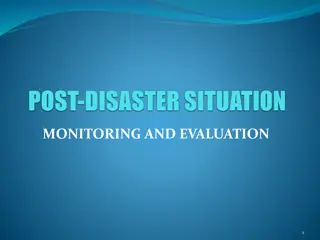Nigeria Health Population and Nutrition Evaluation
This evaluation focuses on comparing integrated health programming with a disease-focused approach in Nigeria. Key components include quantitative assessments, DHIS2 data analysis, process monitoring, and qualitative studies.
Download Presentation

Please find below an Image/Link to download the presentation.
The content on the website is provided AS IS for your information and personal use only. It may not be sold, licensed, or shared on other websites without obtaining consent from the author.If you encounter any issues during the download, it is possible that the publisher has removed the file from their server.
You are allowed to download the files provided on this website for personal or commercial use, subject to the condition that they are used lawfully. All files are the property of their respective owners.
The content on the website is provided AS IS for your information and personal use only. It may not be sold, licensed, or shared on other websites without obtaining consent from the author.
E N D
Presentation Transcript
TEACHERS REGISTRATION COUNCIL OF NIGERIA S SUBMISSION TO THE NIGERIA S ANNUAL EDUCATION CONFERENCE 2019 PANELIST DISCUSSION/PRESENTATION WITH THE THEME EDUCATION FOR SUSTAINABLE LIVELIHOODS: A SYSTEM APPROACH TO STRENGTHENING THE SECTOR FOR PRODUCTIVITY AND GLOBAL COMPETITIVENESS
Preamble The Teachers Registration Council of Nigeria (TRCN) was established by Decree 31 of 1993 now CAP T3 of 2004. This Act empowers the Council to among other responsibilities to; Determine who are teachers in Nigeria, Determine what standards of knowledge and skill are to be attained by persons seeking to become registered as teachers under this Act and raising those standards from time to time as circumstances may permit, Secure in accordance with the provisions of this Act the establishment and maintenance of a register of teachers and the publication from time to time of the lists of those persons, Regulate and controlling the teaching profession in all its aspects and ramifications, Classify from time to time members of the teaching profession according to their levels of training and qualification, Perform through the Council established under the Act the functions conferred on it by the Act.
Registration and Licensing The Council in line with her mandates aimed at knowing WHO IS TEACHING initiated Registration and Licensing of teachers for the continuous strengthening of teacher quality and effectiveness. TRCN opened more liaising offices in Lagos and the FCT to ensure that teachers get easy access to her activities. Also, the other state offices across the country were strengthened to go on sensitization drive to schools for creating more awareness in both public and private schools. To this extent, the Council has registered over 2 million and licensed close to 200,000 teachers.
Disengagement of Unqualified Teachers In line with the policy to disengage unqualified teachers from the classroom which has been a recurring decimal in Nigerian Education sector, the National Council on Education in the year 2003 at the 50thNational Council on Education (NCE) meeting in Yenegoa gave a directive for the disengagement of Teachers. In order to make this a reality, TRCN put several programmes in place like the Post Graduate Diploma in Education, Post- Doctoral Diploma in Education as well as harmonization of Post Graduate Diploma in Education (PGDE) in all the Colleges and faculties of education in all tertiary institutions to enable all teachers get opportunity to upgrade themselves. This disengagement of unqualified teachers directive was reiterated at the 62ndand 64thNCE meetings held in Kano and Rivers States respectively.
Disengagement of Unqualified Teachers CONTD. The Honorable Minister of Education, Mallam Adamu Adamu reiterated the resolve for TRCN to disengage unqualified teachers from the Nigerian classrooms by 31stDecember, 2019. He categorically informed delegates that the country was not going back on this. In order to ensure that this comes to a reality, the Council has written and forwarded a reminder letter to all critical stakeholders in Education on the deadline for unqualified Teachers to leave the Nigerian classrooms come 31st December, 2019. States have also commenced radio jingles on the deadline. Some states used the local languages of the immediate environment to drive the message home.
Professional Qualifying Examination/ Professional Qualifying Examination Integrated (PQE & PQEI) Similarly, the Council in her efforts to professionalize as well as raise the standards of teaching in Nigeria introduced the Professional Qualifying Examination (PQE) in 2017 as a pre- requisite for Registration and Licensing of professional teachers. The PQE is conducted twice in a year, May and October. Currently, 52,000 candidates have been registered to sit for the October diet slated for 13th-14thOctober, 2019. In addition, TRCN has expanded access of the PQE to education graduates of teacher training institutions across the country tagged Professional Qualifying Examination Integrated (PQEI). Also worthy of mention that the Council has developed an online software for PQE . The platform is to cater for the need of teachers in Diaspora willing to register and license as professional teacher and also obtain the Letter of Professional Standing from the Council. The Council conducted successfully the first online PQE to teachers in the diaspora on November 19, 2019.
Career Path Policy for Teaching Profession in Nigeria TRCN has developed a Career Path Policy for Teaching Profession in Nigeria. In line with her regulatory functions, the Council noted that there was no career path policy for the teaching profession in Nigeria. Through the Career Path teachers shall be empowered to develop creative solutions with their colleagues and who will work together to problem solving, making measuring from a wide array of students learning data. develop creative solution to address our most critical educational challenges, provide growing evidence for teachers collaboration and improve the effectiveness of teachers especially of in-experience teachers and their peers to positively affect students learning out comes.
Career Path Policy for Teaching Profession in Nigeria CONTD. The Policy will guide the recruitment, retention, development, training and promotion of teachers to ensure they meet the requisite standards in line with international best practices. A four tier stage processes as thus: dialogue meeting of education experts and International Development Partners on education projects in Nigeria to enrich the draft document, share and formulate the policy process strategies to help bring about the modalities for implementation;
Career Path Policy for Teaching Profession in Nigeria CONTD. engagement of education stakeholders including, the academia, Federal and State Ministries of Education and parastatals; Office of the Head of Service of the Federation; State Universal Basic Education Boards; LGEAs; International Development Partners, Civil Society organizations, Professional Associations; Labour Organizations (NUT/NAPPS); school leaders, teachers and Parent Teachers Associations (PTA). The document was enriched after a critique and harmonization of all inputs from various experts in the education sector; evaluation/assessment of amendments and incorporation of the inputs into the document and development of the draft implementation guidelines by the Core Group of education experts;
Career Path Policy for Teaching Profession in Nigeria CONTD. review of the harmonized draft document from the Core Group to ensure consistency with the National Policy on Education and 2014 National Teacher Education Policy (NTEP); and finalization of the implementation guidelines by the technical education experts.
Development and Review of Professional Standards for Teachers in Nigeria The Council embarked on review of one of her critical documents that defines what a professional teacher must know and put into practice as well as the core values, ideals and conducts that professionals must exhibit. The review became imperative as a result of emerging issues and activities in the education sector and the need to standardize professional practice to meet international specification. In order to provide an inclusive framework, the Council invited stakeholders from UBEC, NUT, Deans of Faculties of Education, Provost of Colleges of Education and Rectors of Polytechnics, NAPPS, SBMCS, classroom teachers and PTAs. This review was done with support from UBEC.
Nigerian Teacher Continuing Professional Development Assessment Framework The Council developed (NTCPDAF) to mitigate the problem of incompetent teachers in the system. The NTCPDAF is developed to be used by TRCN in collaboration with teacher employers to periodically assess their teacher/ employees to ascertain their developmental needs and provide opportunities for them to improve in their profession and service delivery.
Mandatory Continuing Professional Development (MCPD) The TRCN manual on Mandatory Continuing Professional Development (MCPD) was put in place to enable the capturing of records of credits earned by teachers in workshops, trainings and seminars which is in-turn used to renew teachers licenses. The NCE in its wisdom at the 62nd meeting in Kano urged all stakeholders to adopt the MCPD manual for all in-service teachers training programmes in the country. However, the major challenge the Council is facing is that not many stakeholders are keying into this NCE directive sequel to which the Council is finding it very difficult to get needed data on teachers that have been trained to populate on the TRCN database for renewal of teachers licenses.
Mandatory Continuing Professional Development (MCPD) CONTD. The Council thereby seeks that all MCPD providers key into the NCE to enable TRCN to not only monitor the process but as well build data of teachers that have been trained into TRCN database for license renewal and proper distribution of trainings to desired teachers need areas ascertain competences for the categorization of teachers in line with the career path stages (a) Beginner (b) Proficient (c) Mentor and (d) Distinguished.
Digital Literacy for Nigerian Teachers TRCN embarked on digital literacy training programme for teachers to keep them abreast of national/global trends in innovations in ICT to enable them bring the knowledge to bear in their teaching and learning processes. The Council is planning to extend the digital training to teachers across the remaining zones as soon as there is availability of funds.
Letters of Professional Standing Another major area of quality control is the issuance of letters of professional standing to teachers willing to pick up teaching appointments outside the shores of Nigeria. It is an article of faith endorsed by all member countries of the International Forum of Teaching Regulatory Authorities (IFTRA). TRCN has been issuing these letters of Professional Standing to Nigerian Teachers seeking to pick-up teaching appointments outside the country.
Accreditation, Monitoring and Supervision of Teacher Education Programmes at all levels of the Nation s education system To ensure standard in the education practice and conducts as well as maintaining the integrity and standards of teaching profession in Nigeria, TRCN undertakes the accreditation of courses and programmes of teacher education institutions.
Professional Conducts The Council also maintains discipline among all professional teachers at all levels through professional conducts and enforcement which includes Teacher Investigating Panel, Teacher Code of Conduct and Teacher Tribunal.
Induction of Students at the Point of Graduation The target of TRCN is to ensure quality education by having professionally qualified teachers in the classroom and also to ensure that teaching regains its pride of place in the comity of professions in Nigeria. TRCN through her resolve in achieving her mandates has carried out the above programmes focused on making the Teaching profession a toast among all.
The Teachers Registration Council of Nigeria (TRCN) was established to address the first question of who is teaching? A very critical and important aspect of the TRCN mandate are that TRCN shall: determine for Nigeria who is a teacher, the standard of knowledge and skills required to be a teacher and raise such standards from time to time. The National Teacher Education Policy stipulates that teachers need to constantly upgrade their skills in order to remain competent and relevant which implies that they remain productive and effective in the discharge of their duties, to address the continuous development production and effectiveness of teaching in Nigeria. Only qualified registered and licensed teachers should be considered.
The best way of raising quality, productive and effective teachers is through Mandatory Continuing Professional Development Programmes (MCPD) TRCN has developed policies, frameworks, manuals, and guidelines on the Continuing Professional Development (CPD) of teachers in the country. All these policies and documents has passed through the National Council on Education and received the endorsement, approval and directive for stakeholders to implement them. This is with a view to enhance the capacity of teachers for productivity and effectiveness of teaching and learning in our Nigerian classrooms.
Noting the importance of CPD for teachers, TRCN through the JCCE/NCE process sought the approval for MCPD providers in the country to involve TRCN in monitoring all CPD training programmes so as to capture in the template designed by TRCN, the records of teachers participation in the trainings in order to allocate the required MCPD credit earned in line with the provisions in the developed MCPD manual of TRCN. These records will be incorporated in the TRCN database of professional registered teachers to ascertain that only qualified and registered teachers are trained.
The MCPD manual also stipulates that professional teachers shall earn the required credits within a cycle of three (3) years. This implies that every teacher has a grace of three (3) years to earn the minimum required credit units stipulated for his/her career growth in the system. Effective professional development is needed to help teachers learn and refine the pedagogies required to teach these skills which results in changes to teachers knowledge, skills, conduct, values and practice consequently improvement in students learning outcomes. Teachers should be trained on using the professional standards for Nigerian Teachers developed by TRCN. The professional standards for teachers in Nigeria is developed to address the professional knowledge, skills, conduct, values and membership of the teacher.
The Policy on Career Path for Teaching Profession in Nigeria which recently received the endorsement and the approval of the National Council on Education (NCE) was developed to help teachers advance in their Career Path through Continuing Professional Development (CPD), and to guide teachers and school leaders, recruitment, deployment, motivation and retention. The Policy also included a section on Monitoring and Evaluation an area which is mostly neglected. We seldom monitor and evaluate our programmes to ascertain their impacts, strategies, methodologies and eventually adopt and improve on new innovations for productiveness and effectiveness. To mitigate some of these challenges in education the Honourable Minister of Education engaged State Commissioners of Education and Heads of Parastatals/Agencies in the Education sector on a two (2) day retreat which focused on key priority areas of the Ministerial Strategic Plan (MSP) on Education 2030.
One of the key priority area was to address the current situation on Capacity Building for teachers. Major challenges were identified among others at the retreat as thus: Absence of needs assessment for teachers before the conduct of any professional development. Absence of effective monitoring of CPD for teachers.
To address these challenges, stakeholders at the retreat were advised to; Institutionalize Teachers Continuous Professional Development to improve the teacher s teaching skills and competencies. Conduct a need assessment before organizing any professional development for teachers to identify areas of needs and channel appropriate training to teachers in a particular State. Teachers professional development is often determined by what teachers need, a system that does not ensure that the needs of teachers are being identified and met professional development will not be effective as it should be.
The retreat further discussed the need to: Tailor training and development to individual needs after the conduct of a Need assessment. Submit to TRCN all training package for accreditation to ensure that qualified MCPD providers are engaged and determine that the training content are in line with the professional regulatory provisions. Adopt and use the MCPD manual of TRCN in all CPD programmes. Liaise with TRCN to obtain the list of professional teachers for training and involve TRCN in the monitoring to obtain records of teachers trained for incorporation into the teachers database for renewal of teachers licenses and competency assessment for career advancement. Train teachers on the professional standards and teachers code of conduct to determine their performance and competency level.
In 2012 the then Honourable Minister of Education Prof. Rukayatu Ahmed constituted Ministerial task teams. The teams were saddled with the responsibility of working on critical challenges in the education system. One of the areas the task teams worked was the development of frameworks on Need assessment and professional development, the frameworks were comprehensively developed with the technical participation and inputs from Ministries, Departments and Agencies (MDAs) and International Development Partners (IDPs). These frameworks never saw the light of the day. The Federal Ministry of Education need to implement the frameworks. I strongly recommend that the communique of this conference should ask for the resuscitation and implementation of the frameworks on Need assessment and professional development framework. With further recommendations to adhere to the directive of the National Council on Education (NCE) to adopt the TRCN MCPD manual, submit to TRCN all training package for accreditation to ensure that qualified MCPD providers are engaged and to determine that the training content are in line with the professional regulatory provisions.
To sustain teacher quality, productivity and effectiveness there is need to build the capacity of teachers through Continuing Professional Development (CPD). I want to assure us that the country has developed a lot of documents/frameworks that will help in effective professional development of teachers. The problem remains on implementation.








